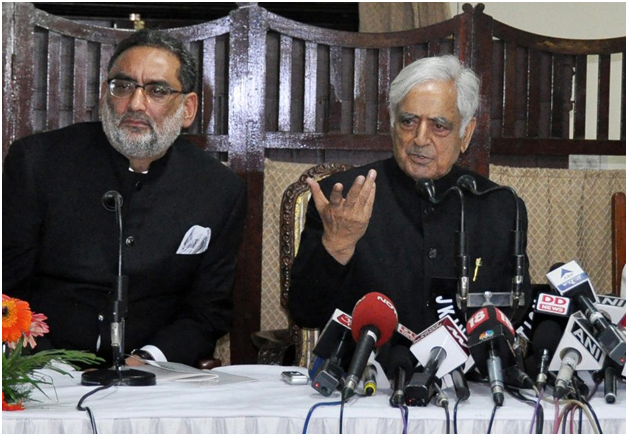Contradictions in Jammu and Kashmir Rock Parliament, PM Distances Himself from Mufti
The controversial press conference by Jammu and Kashmir chief minister Mufti Mohammad Sayeed.

NEW DELHI: The contradictions came home to roost even before the new government in Jammu and Kashmir had tasted the first flavours of power. Even as Chief Minister Mufti Mohammad Sayeed was speaking, a television channel, flashed the first lines that rocked Parliament, led to walk outs, with the Opposition demanding a statement from Prime Minister Narendra Modi.
PM Modi in his response to the Presidents address in the Rajya Sabha spoke loudly, with passion, with the words carrying little except disdain for “someone who might speak somewhere” in reference to the Chief Minister of Jammu and Kashmir. He said that the Bharatiya Janata Party-Peoples Democratic Party government in the state would be run on the basis of the common minimum program. He said “we cannot support any statement by anyone” in reference to Mufti’s controversial remarks, stressing on “zero tolerance” to terrorism.
He said that the government cannot respond on the basis of “a statement by anyone” and went on to insist that all the resolutions of Parliament on Jammu and Kashmir would be followed by his government. PM Modi applauded the Kashmiri voters for putting their stamp on the “akhandta and ekta” (integrity and unity) of India. As Opposition leaders told The Citizen that the “someone” the PM was referring to was his own chief minister.
The government had earlier, under pressure, disassociated itself from Mufti’ s remarks with Union Home Minister Rajnath Singh saying, “"Our government and the BJP fully dissociate with the statement.
The credit for conducive environment for polls in Jammu and Kashmir goes to the Election Commission, our armed forces and the people.” He said he was making the statement after discussing it with Prime Minister Narendra Modi.
The CM’s words that initially offended New Delhi are, "I want to say on record and I have told this to the Prime Minister, that we must credit the Hurriyat, Pakistan and militant outfits for the conduct of assembly elections in the state."
Mufti further said, "People from across the border made the atmosphere conducive. They also have assets -- Hurriyat, militants... if they had done something (during the election) such a participation of people would not have been possible. This gives us hope."
Hot on its heels came a statement signed by nine leaders of the Peoples Democratic Party stating that the “ mortal remains of Afzal Guru should be brought back to the state.” This has become an emotive demand in the Kashmir Valley, and was supported by the PDP in strident tones before and during the election campaign. The PDP cannot distance itself from this demand, and the statement issued to the media might have only nine signatures but is supported by the entire party.
The Chief Minister has gone silent since although his daughter Mehbooba made a valiant attempt to defend him. The Opposition parties have held PM Modi responsible for the government in Jammu and Kashmir and are demanding a clarification. In the Lok Sabha the Opposition parties wanted to move a resolution on Mufti’s remarks and walked out when they could not. The House remained agitated for a second consecutive day on the issue, and was adjourned twice with the government finally having to distance itself from the Chief Minister’s remarks.
The contradictions, thus, have started hitting the BJP-PDP coalition in Jammu and Kashmir even before expected. Mufti spoke as he does in the Kashmir Valley, and hit a raw nerve at the centre. Opposition leaders have taken up the issue more to hit the BJP government at the centre than Mufti per se, and to highlight the contradictions in what most of them have described on the record as an “opportunistic alliance.”
The BJP that would have ignored these remarks and did until the opposition raised it in Parliament, found itself in the dock. As opposition sources here said, the BJP now knows that it will be held accountable for every act of omission or commission by the government in Jammu and Kashmir and cannot throw up its hands without being held accountable and responsible for what is said and what is done. The remarks that the Opposition parties would not have raised normally led to walk outs because of the nature of the government, that is being referred to by all opposition leaders here as an “unholy alliance.” The decision was thus taken by the opposition in the Lok Sabha to “expose” the alliance, and to make the BJP take ownership for the Jammu and Kashmir government.
Mufti, through this alliance with the BJP, has lost the support of all the opposition parties and as the Home Ministers comments demonstrated, he cannot count on the support of his new ally in power. The BJP, given its agenda and constituency, will not be able to support the Peoples Democratic Party’s positions that have always been seen as more radical than the National Conference.
The first shots have been fired at Mufti, making the position very clear to him and the PDP that they had only one of two options. One to stick to their position and thereby lose the government; two, to move away from their stated positions and thereby lose their support base in the Valley. The contradictions that will continue to hit the state government and rock New Delhi cannot be managed, not even by astute politicians, without



